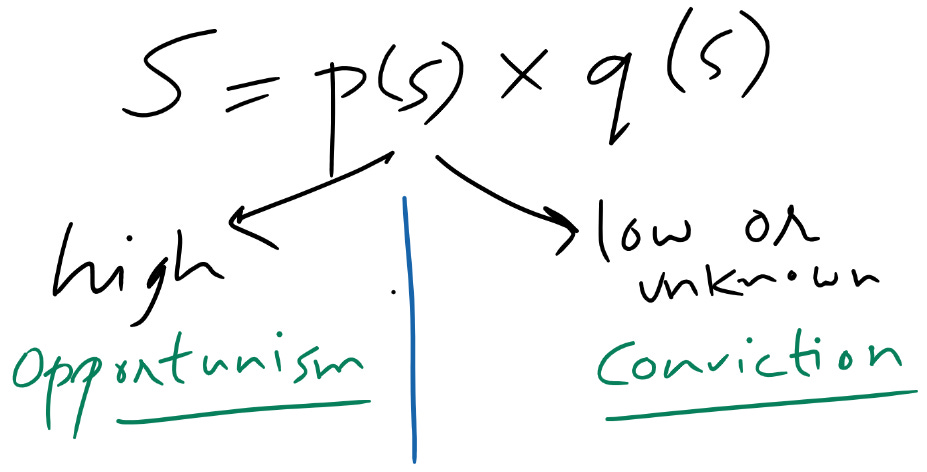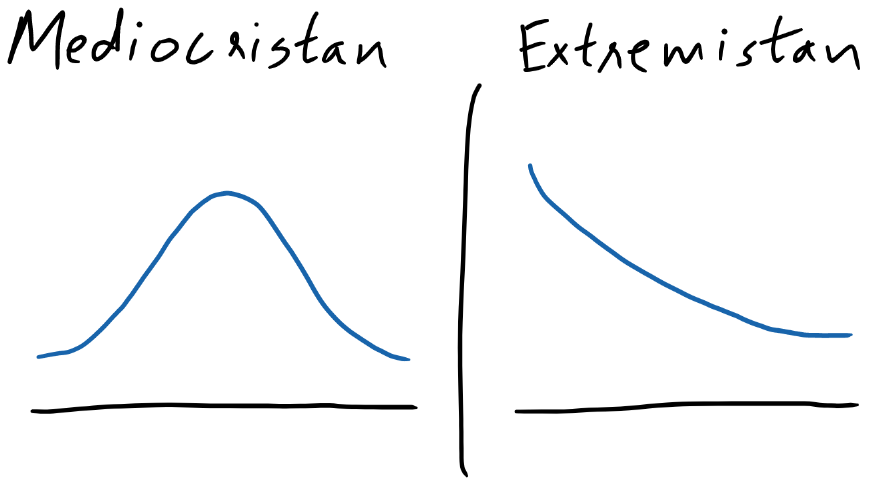Opportunism and Conviction
When I see people around, I often see people (including myself) taking pride in being opportunistic. Perhaps this pride comes from the belief that finding opportunities is hard. And often that’s true, it’s not easy to place deterministic (even if short-term) bets on the future when a lot of the future is unknowable.
Lately, it has dawned on me that opportunism is the easier route. Let me explain.
Opportunism is seeing good bets for the future, by understanding what is working. A manifestation of this could be evaluating different options you’d have, see which ones are working well or have higher chances of success, and choosing those.
Conviction, on the other hand, is operating in a domain where either the probability of success is low or is unknown and the only thing guiding you forward is belief or ‘gut’.
To put it differently,
Why is opportunism easier?
Opportunism occurs in the face of data, conviction often happens in absence of or ignoring existing data and trusting your intuition.

If you were in Elon’s shoes and possibly the wisest person on the planet is saying you this, you’d probably give up. What kept Elon going then was not data, since it was virtually absent then, but conviction.
There’s this quote from a poem by W.B.Yeats
“The best often lack all conviction, while the worst are full of passionate intensity”
I’d modify it slightly.
Instead of two, there are three kinds of people -
The Fool —> rushes in with courage into a situation
The Optimiser —> looks at each situation, carefully weighs each situation and then places bets
The Genius —> rushes in with courage into a situation
This may give an impression that there’s no difference between the fool and genius. But we of course know from our experiences that there is. So what’s the difference?
Axis of decision making also swings across the spectrum -
And this leads to the main difference in approach
Paths to these personalities
You start out as a fool, rushing in with brute force into situations.
Add education and you become optimiser. That’s because education, in its current form, has often taught people to evaluate existing paths and choose the best ROI one, often based on what other people have chosen.
Add courage and you often get the Schrodinger’s cat situation - you dont know if you are a fool or genius.
Add first principles and you get genius. This is only valid in domains where deduction works well, and it often doesn’t.
Some side notes on these three personalities -
The optimiser looks at each of the other two and thinks they are better than both based on the approach they take
The fool often thinks they are the genius
The genius often constantly self-evaluate that they are not the fool. It’s often very hard to know the truth here because market feedback is almost entirely missing.
Distribution of outcomes
In Antifragile, Taleb outlines two domains, Mediocristan and Extremistan. The former is when the outcomes are less variably distributed (often a normal distribution), the latter has high variations.
In low variation environments, data is reliable and hence traditional statistical tools like mean and variance are handy. The predictive nature of Mediocristan also makes opportunism more useful since opportunism, because it occurs in the face of some data, leads to better probability weighted outcomes (materially).
In high variation environments of Extremistan, data is not reliable and hence, conviction guides the way, it has the potential for highly outsized outcomes but higher chances of failure.
Entrepreneurs, artists operate in Extremistan, with a power law distribution of outcomes. In these domains, conviction matters more.
Summarising, conviction works on intuition, is in more uncertain territory and often leads to highly distributed outcomes. Opportunism works on data, is in more predictable territory and often leads to low variance outcomes.
So again, why is conviction harder?
Opportunism has to be seen. Conviction has to be built. And building is harder than seeing.
P.S. While I was busy wrapping my head around drawings of this article, Y Combinator also released a video based on this ‘midwit meme’. It doesn’t go to all the repercussions of the idea but is still a good watch.












